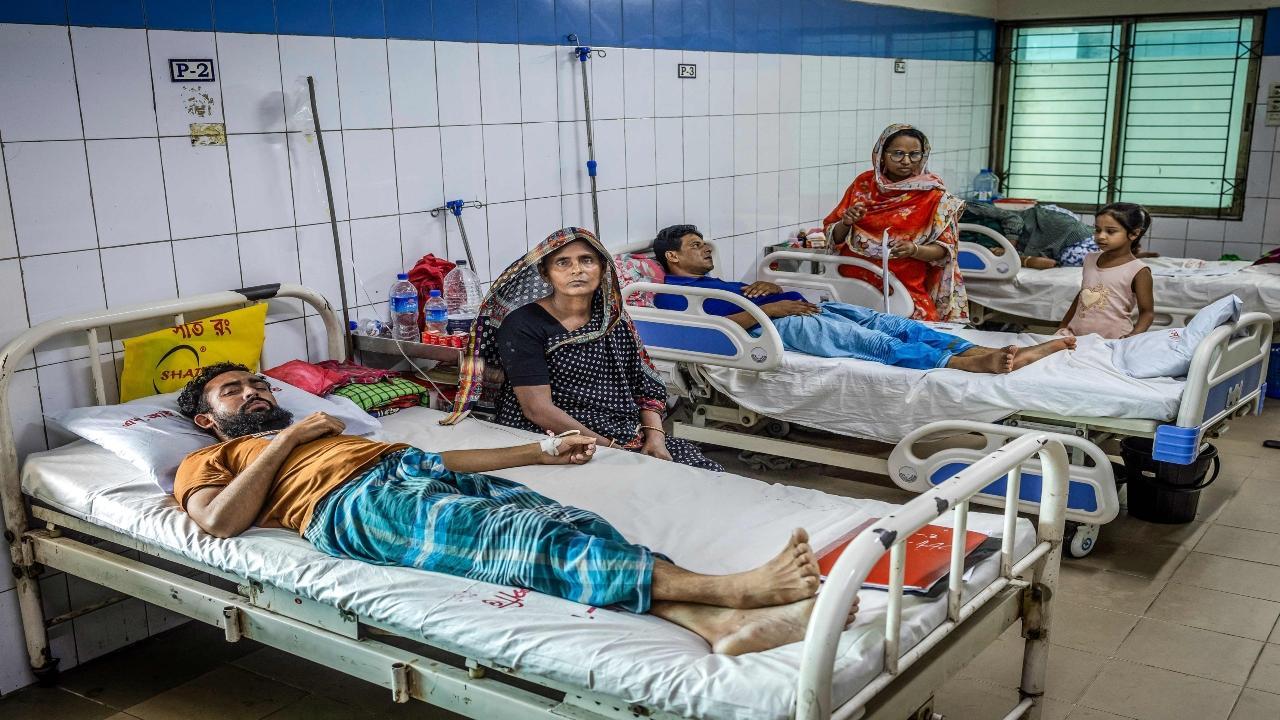Bangladesh witnessed chaos after PM Sheikh Hasina's govt collapsed on Aug 5 amid violent protests over quota reforms for government jobs. Before that, the anti-government protests had killed more than 500 people since mid-July. The UN human rights body said the number of reported killings in revenge attacks since August 5 remains to be determined

Patients who were wounded by shotgun pellets during the student-led uprising that ousted the 15-year rule of ex-premier Sheikh Hasina, at the National Institute of Opthalmology and Hospital in Dhaka. Pic/AFP
A team of experts from the United Nations (UN) arrived in Dhaka on Thursday on an eight-day visit to discuss the process for investigating the human rights violations during the recent Bangladesh unrest, which led to the collapse of Prime Minister Sheikh Hasina's government on August 5, news agency PTI reported.
"A team from the Office of the UN High Commissioner for Human Rights will be visiting Dhaka from August 22 to August 29 for preliminary discussions with the Interim Government and other stakeholders," a media advisory sent by the Communication Team of UN Resident Coordinator's Office in Bangladesh stated.
It said that the purpose of this visit is to understand the organisation's priorities for assistance in promoting human rights in Bangladesh.
"It is important to note that this visit is not an investigation, but rather it will focus on discussing the process for investigating human rights violations in light of the recent violence and unrest," the state-run BSS news agency quoted the advisory as saying.
Bangladesh witnessed chaos after the collapse of Hasina's government. The former PM fled to India on August 5 following her resignation amid violent protests over quota reforms for government jobs. The Army stepped in to fill the power vacuum the same day. Three days later, Nobel laureate Mohammed Yunus took oath as the Chief Adviser to the interim government.
The UN Resident Coordinator's Office said that the delegation's visit is in response to a request from Bangladesh's Interim Government.
Once the details are finalised, it said, a separate fact-finding team will be dispatched in the coming weeks to conduct the investigation.
The UN High Commissioner for Human Rights has conveyed admiration, solidarity, and support to the people of Bangladesh, particularly the youth, as they work towards advancing human rights for all, said the advisory.
The team is expected to meet with several government advisers and civil society members during their visit to gather information.
The move was announced by UN human rights chief Volker Turk during a recent call with Yunus.
The government has expressed its readiness to cooperate with the UN team to ensure a fair and impartial investigation, the report said.
The team is expected to discuss detailed terms and conditions for investigating all the human rights violations that took place between July 1 and August 15.
According to a primary report of the UN Office of the High Commissioner for Human Rights published on August 16, between July 16 and August 11, around 650 people were killed in Bangladesh during the student-led protests and after the fall of Hasina's Awami League regime. While around 400 deaths were reported from July 16 to August 4, nearly 250 people were killed following the ouster of the Awami League-led government on August 5 and 6.
The reported death toll is likely an underestimation, as information collection has been hindered by restrictions on movement owing to the curfew and the internet shutdown, the OHCHR said.
The UN human rights body further said that the number of reported killings in revenge attacks since August 5 remains to be determined. Those killed include protesters, bystanders, journalists covering the events and several members of the security forces.
Thousands of protesters and bystanders have been injured, with hospitals overwhelmed by the influx of patients. The majority of deaths and injuries have been attributed to the security forces and the student wing affiliated with the Awami League.
This will be the first time the UN is sending a fact-finding mission to Bangladesh since its independence in 1971 to investigate widespread human rights abuses in the country, the Chief Adviser of the Government of Bangladesh said in a post on X last week, the handle for which is run by Yunus' office.
UN human rights chief Turk last week assured his support and said an inclusive, human rights-centred approach will ensure the transition in Bangladesh succeeds.
Turk had underlined the need for accountability for all those responsible for human rights violations and violence, including against religious minorities, in Bangladesh.
A complaint was also filed on Wednesday with the investigation agency of Bangladesh's International Crimes Tribunal against Hasina and eight others, accusing them of committing genocide and crimes against humanity during the mass movement of the students against her government.
Bangladesh's International Crimes Tribunal has already started an investigation against Hasina and nine others on charges of genocide and crimes against humanity that took place from July 15 to August 5 during the students' mass movement against her government.
(With PTI inputs)
 Subscribe today by clicking the link and stay updated with the latest news!" Click here!
Subscribe today by clicking the link and stay updated with the latest news!" Click here!










